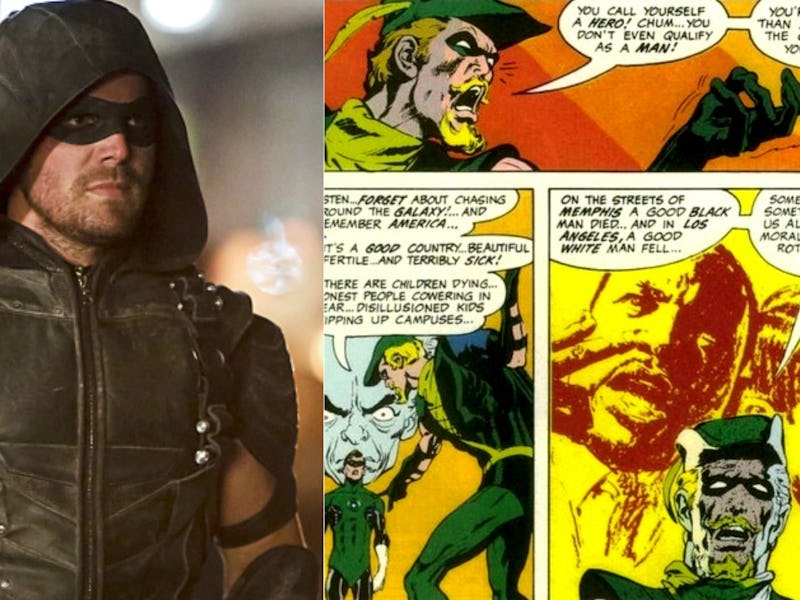'Arrow' Should Matter, But It Doesn't
What the TV series has forgotten about DC's emerald archer.

Only the internet could make “social justice” sound bad. What the National Association of Social Workers head-quartered in D.C. defines as the view in which “everyone deserves equal economic, political and social rights and opportunities” has, for some reason, been interpreted as a vindictive agenda pursued by hella mad women. How dare people live equally, y’know?
Meanwhile, superhero comics, TV, and movies, quite literally, have “social justice warriors” (or “SJW,” in abbreviated form). No matter their superpowers, all capes and cowls enact change while defending those powerless to defend themselves. Superheroes take up what broken legal arms are ill-equipped to handle. But more than any other superhero “SJW” in 75-plus years of American comics — even more than Batman, who in his early days fought for the wealthy elite against the poor — is DC Comics’ Green Arrow. Since Dennis O’Neil and Neal Adams wrote the character in the ‘70s, the Emerald Archer has been an advocate for the underprivileged and underrepresented.
So, why isn’t he doing that in his own TV show?
In the underwhelming fourth season of Arrow, Oliver Queen (Stephen Amell) fights Neal McDonough’s scene-chewing Damien Darhk, a telekinetic mastermind with an authoritarian mean streak who strong-arms Star City. He’s prepared to nuke the town while an “ark” (a big ass bio-dome) keeps the elite underground. While the season was disappointing because of oh so many reasons, the premise of a villain like Darhk seemed ripe to uphold the character’s legacy as a defender of the underclass, as a literal social justice warrior.
But it didn’t. Darhk’s protection of the elite, plus additional threads like Oliver’s mayoral campaign and Felicity’s unfathomably invasive hacking were not considered to advance any of Oliver’s progressive politics. In fact, Arrow has largely ignored the character’s well-known bleeding heart in favor of broader tales that behave like Greek epics.
Is Arrow missing its opportunity to matter?
In the ‘70s, O’Neil and Adams sent Oliver on a lecture-heavy road trip with the cosmic cop Green Lantern in the renowned series Green Lantern/Green Arrow. Racism, poverty, drug addiction, it was all there, with no sci-fi analogs or substitutes for heroin or poor black people to soften the story. Green Arrow and Green Lantern straight-up met heroin addicts and poor black people.
Dennis O'Neil and Neal Adams' 'Green Arrow/Green Lantern' directly addressed modern American society -- with no metaphors or sci-fi analogs to mask its themes.
Aspects of these books have made their way into Arrow but it’s never been dominant in the narratives. In Season 1, the neighborhood “the Glades” was known for its rampant crime and poverty. The show introduced gentrification conflicts with Queen opening a trendy nightclub, but like the club itself the whole matter was abandoned.
In Season 2, the miracle drug “Mirakuru” propelled the show to thematic highs — but the drug wasn’t an addictive narcotic. It was a steroid, used by Deathstroke to build an army, while another drug called Vertigo behaved like an addictive that Thea, Oliver’s sister, got hooked on. But it only stimulated the plot, and did little to change Thea in the longer term.
The strongest connection to Oliver’s altruistic roots was the Season 1 plot device: Mr. Queen’s notebook. In Arrow, Oliver was a billionaire heir roughened into a vigilante after years on a harsh island in the North China sea. After fighting mercenaries, assassins, and um, magic totems (seriously, fuck Season 4), Oliver returns with a vendetta. His father named names, white collar criminals responsible for the state of then-named Starling City. And it became Oliver’s duty to right wrongs and serve justice.
He mostly did. But Oliver was a vengeful killer, gleefully torturing for information. It’s not something the liberal and goateed Green Arrow would approve, but that Arrow was unambiguously an origin story held the vague promise that Oliver would someday change into, in his own words via the show’s intro narration, “something else.” Four years later that hasn’t happened, and the show is no closer to resembling the Green Arrow as readers have known him.
And Season 4 could have been the year for it! In the weirdly anti-climactic finale, Green Arrow leads ordinary Star City citizens against Damien Darhk and his oppressive army. But thanks to the season’s underwhelming narrative, the finale didn’t resonate. Instead of the beacon for change the Green Arrow had become, he was just a generic superhero leading a dumb-looking riot.
It’s unfortunate Arrow is missing its chance to matter. TV shows never have to be politically or socially-minded, but it’s damn appreciated when they do. More than any other archetype, superheroes defend or force societal change. And they’re commercially popular, so it matters when superhero media behaves like actual superheroes and stand for something. Marvel’s Jessica Jones explored abuse, manipulation, assault, and gender politics within the framework of the genre. Not only is Jessica Jones one of the best this age of superheroes has produced, it’s changing how people understand abuse. That’s an achievement worthy of a Peabody Award.
But while Arrow seems to forget who Oliver is, DC’s new books are embracing those roots. In the DC Rebirth, Green Arrow: Rebirth #1 Oliver unabashedly calls himself a “social justice warrior.” While his hypocrisy as a wealthy socialite is questioned by Dinah Lance’s Black Canary, it’s already a promising return to a place the Green Arrow so fittingly belongs: Fighting for the poor, for the underrepresented.
'Green Arrow: Rebirth' #1: Back to form for the Emerald Archer.